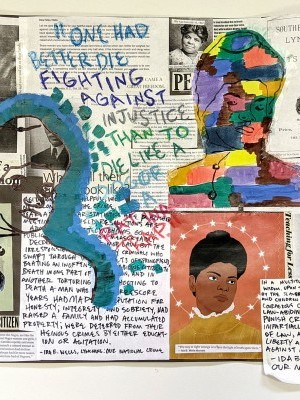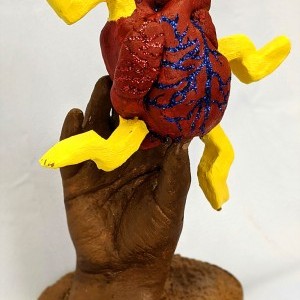Rey Sadoff
Olney Friends School | Barnesville , OH | 11th
Inspirational Family Member
Sissy, My Great-Grandmother
I've heard a lot about my great-grandmother, her name is Ethel Helen, but we call her Sissy. She was a role model to my grandmother, my mother, and my aunt. When I was young I would (carefully) get into her jewelry – pearls, bangles, huge clip on earrings, all of it was lovely and felt very whimsical in my small hands. My family has often compared me to my great-grandmother; they tell me I am lucky enough to get her charm, her elegance, and her kindness. They tell me we would have been kindred spirits and she would have loved to take me shopping, as she often did with my mother and my aunt.
Ethel Helen Moskovitz was born to Ben and Marie Moskovitz, May 18, 1920. From an early age people knew her for her kind and loving personality. In school, she got in trouble for talking during her classes. She graduated high school at sixteen but because in her family not many women went to college she went straight into working retail. When she started selling shoes at Davis Shops, it was during the Great Depression and she wanted to have her own spending money rather than get it from somewhere else. She used the knowledge she gained at Davis Shops later when she became a buyer for women's apparel at her and my great-grandfather, Bernard Geringer's (or Poppy) store, Bernie's. She loved fashion – clothes, jewelry and especially shoes, and everyone wanted to know her opinion. Everyone who knew her knew that she had great taste and every time she spoke to someone she made their day better.
Everyone who knew her also knew that she had amazing style, from customers to strangers on the street, to her own granddaughters. She loved to take them shopping, and they loved it too. Looking back, they have very fond memories of trips to Nashville when they would go for a shopping trip. And everywhere they went she knew people, people who adored her. When she and Poppy started selling clothes, one of their manufacturers would ask for her opinion on their clothing lines just to see if she liked them. She also went with Horace, her brother, to an annual apparel show in Dallas to help him pick out clothes for his store. Sissy always did things to help other people, no matter how big or small, and enjoyed doing it.
Ethel loved her family more than anything and showed it by working hard to provide her children, Michael, Steve, and Judy with everything they needed. She also always tried her best to make sure her children knew they were capable of all the things they aspired to. Because Poppy and Sissy had experienced the Depression, their financial stability and that of their children was very important to them. She knew she couldn't be a stay-at-home mother and she had to work so she hired Ada, whom she had known since she was nine years old, to take care of her children. She was extremely extroverted and loved to engage with customers and meet new people; she took pride in the store and her contribution to the success of the store.
Sissy had strong opinions and always spoke up when she felt she should. She was an advocate of gender equality and believed in women's ability to do the same jobs men did just as well, if not better. She donated frequently to the Jewish National Fund and was considered very liberal for her time. Sissy and Poppy always voted; it was very important to her because her parents were immigrants. She voted regularly throughout her life and at least in presidential elections always voted Democratic. It was very important to Sissy to be Independant and powerful, and when the situation presented itself, she knew how to be commanding. Her regular manner was warm, fun loving – like her father – and she loved to dance; even as she got older she was still a graceful and agile dancer.
Historical Figure I Admire
Ida B. Wells
Ida B. Wells was born in Holly Springs, Mississippi, July 16, 1862 to James Wells and Elizabeth Warrenton. James Wells was a carpenter, involved in politics, and a trustee of Rust College. Elizabeth Warrenton was known as an amazing chef to all the people she cooked for. With three sisters, Lily, Annie, and Eugenia and four brothers, James, George, Eddie, and Stanley, Wells was the oldest of eight. Her parents and little brother were killed by a Yellow fever epidemic that hit Mississippi in the 70's, leaving her an orphan and the primary guardian to the rest of her siblings. After her parents’ deaths, their friends planned to adopt the children, but Ida said that she would rather take care of all of them than have them split up. At sixteen, with no qualifications but a standard high school degree, she moved to Memphis and became a school teacher as a way of supporting herself and her family.
When she was not teaching during the summer, she took classes in Nashville at Fisk University, a historically black college. She challenged people in college, peers and faculty alike, and began to form her reputation as a Civil Rights activist. In 1884, while riding a train home, she was ordered by the conductor to switch seats and move out of the “ladies section”. When she refused to move, she was aggressively pulled from her seat and pushed off the train. She ended up having to get a wagon ride home, in spite of having a ticket for that section. Based on the Civil Rights Act of 1875, which stated that people could not be discriminated against because of race in public establishments, Wells decided to sue the railroad company, Chesapeake and Ohio Railway. She hired an African-American lawyer to fight her case who was later bribed by the railway company; at which point she hired a white lawyer and won her case, receiving a $500 pay out. Later, she took her case to the Supreme Court of Tennessee, in which she lost and the $500 was retracted. Feeling that the ruling her case had received was unjust, she put more effort into investigating and journalism, sparking her political career.
She frequently wrote pieces for The Living Way and later became the co-owner of a newspaper working out of The Beale Street Baptist Church, written by and for black people, The Free Speech and Headlight. Working from these outlets, she was able to express her frustration at the injustices she saw around her and pinpoint the racism occuring that she so frequently saw around her. In 1892, Wells's good friend and father of her godchild, Thomas Moss of People's Grocery, a black-owned Memphis grocery store was murdered by a group of white men. When People's Grocery began to compete with a white-owned grocery store just across the street, owner William Barrett was not happy to say the least and he actively looked for a reason to get Thomas Moss and his associates in trouble. One day when two children – one white, one black – had a dispute over their game of marbles which quickly became a physical fight, the white boy's father ran out to beat up young Armour Harris. Two People's Grocery employees came to Harris's Aid, which soon escalated into an obviously racist fight.
The next day Barrett entered People's Grocery, shot at an employee who took his gun, shot back, missed, and was arrested. Soon after this event, Moss and the two employees who defended Harris were wrongly reported to be working together in violent schemes and were all arrested. In the middle of the night, seventy-five masked, deputized white men arrived to the jail, took William Stewart, Kevin McDowell, and Thomas Moss to a railway station outside of town and murdered them. Just before he was killed, Moss is known to have said “Tell my People to go West, there is no justice here.”
This tragic and violent occurrence was a large part of what really made Wells focus on her writing. In 1892, she established her own booklet about the racist violence she saw around her. Southern Horrors: Lynch Laws in All its Phases called out white people on the harmful, racist things they did everyday and picked apart the dynamic between black women and white men. At this time interracial relationships were met with anger and shock and were not accepted in the least; the assumption was that if a black man and a white woman had sex, it was rape. This misconception was often used as an excuse for the lynching of many black men. Later that year, her newspaper workroom was burned down by angry whites and she was forced to move away. She decided her new home would be Chicago.
In 1893 Quaker Catherine Impey and author Isabella Fyvie invited Wells to speak about American racism and lynching in Britain. Knowing that Frederick Douglass had been offered the opportunity first and that after turning it down himself, suggested her for the role, she gladly agreed to do it. While she was in Britain, she wrote about her travels and her experiences for an American, white-owned newspaper – the only one that openly protested lynching – making her the first African-American woman to write for a popular white newspaper.
Also in 1893, Wells co-wrote a pamphlet to protest the World's Columbian Exposition with Ferdinand Barnett, a widower, father of two children, and Civil Rights activist. Two years later, they were married and became founders, writers, and editors for the Chicago Conservator. In the following years, Wells took charge more than ever as a leader of the Civil Rights Movement, nearly being named a co-founder of the NAACP. Most of the work Wells did with the U.S. Suffrage Movement had to do with black people's disenfranchisement and she encouraged intersectionality throughout all of her work. Later in her career, she was rejected by the white suffragettes because she confronted them about their racism.
Ida B. Wells was so influential because she always did everything in her power to stand up for the things she believed in; she always fought against violence and the neglect of marginalized groups. She raised a family, not once, but twice in her life. She balanced career, activism, children and always kept an open mind.
Deadline Extended
There's still time to join Women Leading the Way.
Become a part of our storytelling archive. Enroll your class today.
Join the Project



